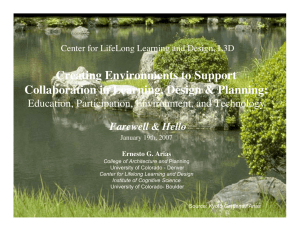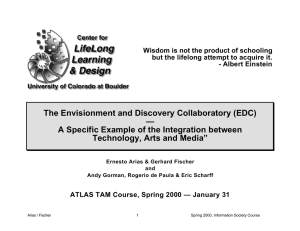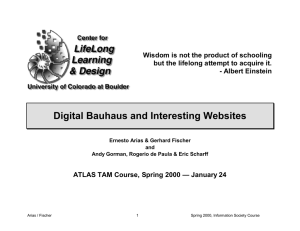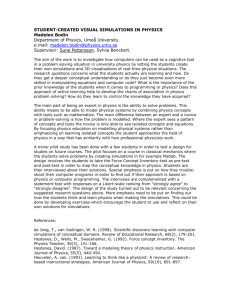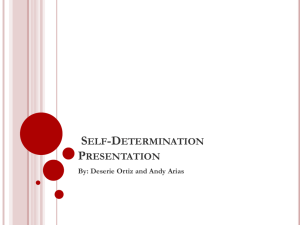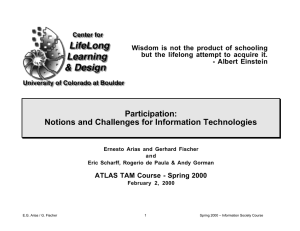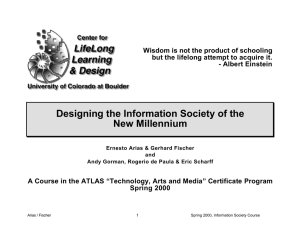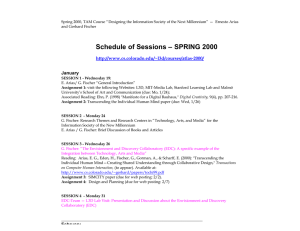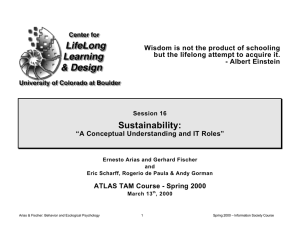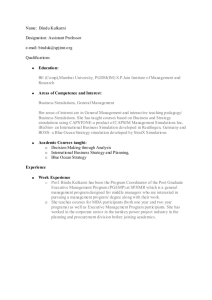Games and Simulations : Constructing Shared Understanding through
advertisement
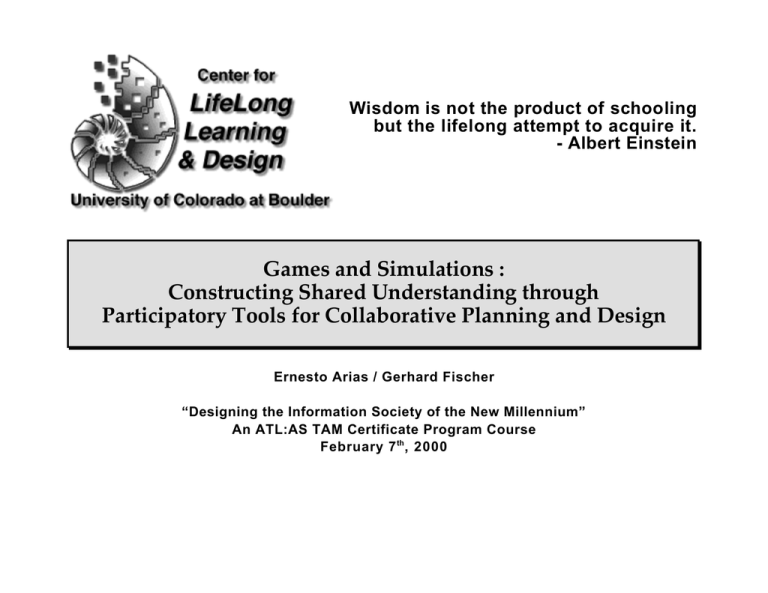
Wisdom is not the product of schooling but the lifelong attempt to acquire it. - Albert Einstein Games and Simulations : Constructing Shared Understanding through Participatory Tools for Collaborative Planning and Design Ernesto Arias / Gerhard Fischer “Designing the Information Society of the New Millennium” An ATL:AS TAM Certificate Program Course February 7 th , 2000 Topics • Related topics – Design and planning Informed participation Communities of practice Distributed cognition and constructionism Evolutionary growth Reasoning behind design Beyond gift wraping Critiquing • Conceptual concerns & examples behind tools • Water simulations for kids – L3D lab (L. Lieu, E. Scharff, E. Arias) • A Critique – A Discussion Creating shared understanding: Ideas behind Games / simulations as participatory planning & design tools Conceptual Concerns • Shared understanding - what can be said • • • • • specification components making information relevant to the task at hand situation awareness incremental formalization interpretable information structures • Collaborative learning, participatory design concepts • Informed participation CSCL paper, 1999 - Beyond Access Urban Studies paper, 1996 -- Helping Neighbours Help Thenselves • Resolution of conflict Informed compromises (individuals) Consensus building (group) Critical coalitions (Arias, 1984, 1998) • Information technology support Physical games EDC vs. SimCity Conceptual Concerns Cont’d. • Context behind technology and tools – locational decision analysis • • • • • • • • Multiple stakeholders (multiple perspectives)--poorly understood Conflict - “my problem is more bigger than yours” ... Cole Neighbor Collaboration – always a challenge Change (changing perspectives) Complex systems -- as domain of application (interrelationships) Wicked problems -- ill structures and ill behaved (Rittel) On demand – can’t wait because the problem will be gone (Fischer) Contingent on situational variables (Arias) • Decision-making support as aim • • • • • Usable and useful information (Lindblom and Cohen, 199) Multiple objective-multiple criteria (Arias and Anselin ‘83, ‘84, ‘94) Symmetries of ignorance (Rittel, 1984)/Asymmetries of Knowledge Trade-offs and Trade-backs (Decision-making literature) Preferences (order and intensity) – (Saaty ’82, Arias ‘93) Gaming-Simulations as decision-support media • SIMLab – CAP • Typology – Field games – Competition vs. Decision-making Board vs. non-board field games Single vs. multiple systems Games vs. simulations • Games - learning Situation given Activities supported – evaluation and prescription Role playing stressed • Simulations - designing Situation constructed Activities supported – description, evaluation and prescription Role playing not stressed • Hybrids – Components – requirements in thinking about IT functionality • Common Languages Virtual-physical integration Object-meaning construction Cognitive Activities supported Description, Evaluation, Prescription • Action space - Simulation-game board Problem setting / study area Virtual-physical integration Object-board interaction • Reflection space Before and now Limitations Components – requirements for functionality Cont’d. • Protocols, rules and roles Interaction between player Interactions between player-tool Player simulation-world linkage Verisimilitude-abstractness • Information Real time data Archival data bases Challenges • User – stakeholders and human behavior predisposition - motivation (Maslow 54) competence - physiological and psycological (Lawton 73) fundamental processes of behavior-(Lang 87, Arias 88, among others) perception, cognition and expressed behavior Participation (see lecture and discussions) Conceptual research issues for IT development • On Artifact-World relationship Support group participation/collaboration (face to face and distributed) Support trade-offs and trade-backs • On Usability, Usefulness and Reusability Support knowledge construction, communication and collection Support critiquing approaches (prescriptive and performance oriented) Enhance user control and transparency • On Integration of Real and Virtual Hardware-software development (major) Data bases Capture design argumentation and rationale • On Assessment and Evaluation Reliability Validity Applicability Flexibility Efficiency and effectiveness How to do it? - A Critique: Discussions on Affordances and Limitations Conclusion – Discussion at L3D lab • Lecture on Games • Critically discuss: The usefulness of games as SimCity in real city planning problems Draw comparisons to the EDC, the water tools for kids and the physical games • Discuss notions such as Collaboration support End-user modifiability Evolution and open systems • Lecture on Participation • is participation a useful concept in the context of information (computational) media? Why or why not? • what implications can be drawn from the concept to information technologies? to design? to art? • what are the limitations of information technology in supporting participation
